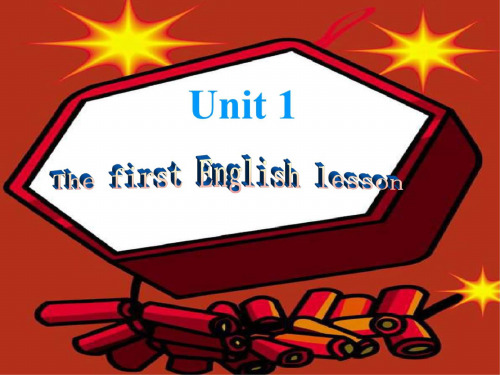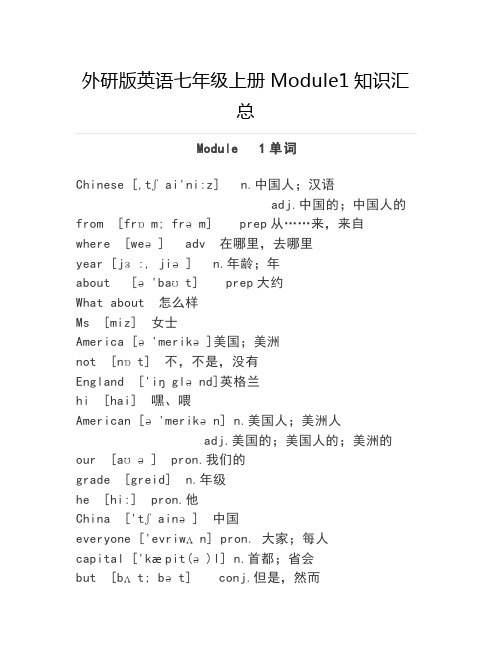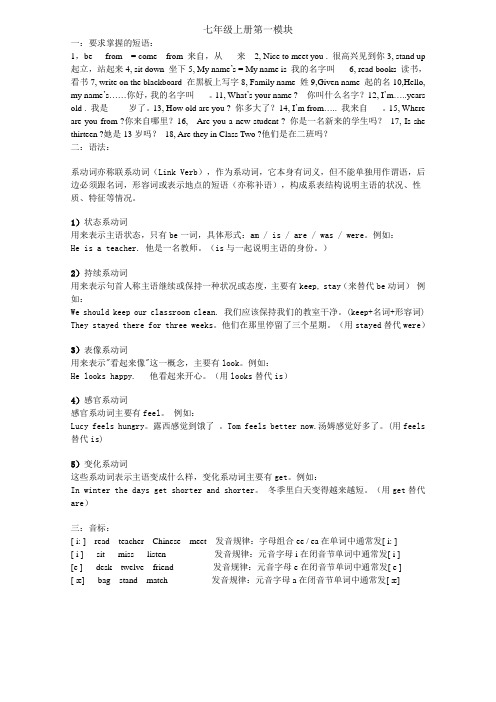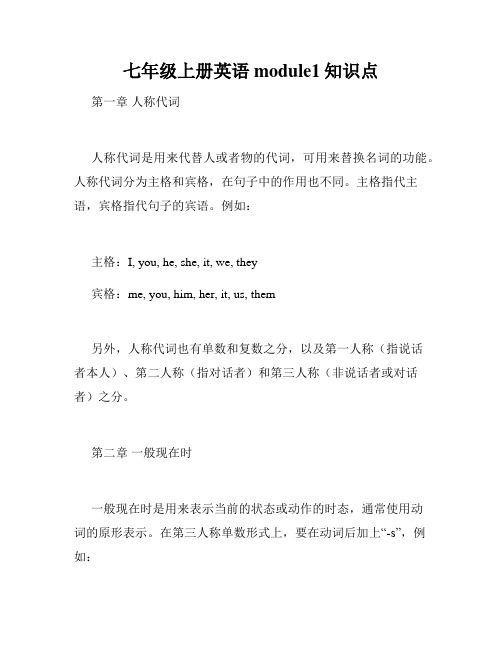初一英语MODULE_1
外研版七年级英语上册课件:Module 1 My classmates

Read act 3 in groups loudly and talk about the pictures.
Daming, Beijing, Chinese, twelve, Class 4
Lingling, Beijing, Chinese, thirteen, Class 4
Betty, America, American thirteen, Class 4
Tony, England, English, thirteen, Class 4
No, she isn’t.
5. Are you from China? Yes, I am.
Complete the passage with the correct form of the words from the box.
America Chinese England grade student
Listening and vocabulary
Listen and check the number of speakers.
1
2
3
Listen again and check the words you hear.
class hello teacher
friend name too
Listen to act 3 and answer the questions. 1. How many people speak in the
七年级英语上学期Module-1-Unit-1外研英语

一个没有地位的家庭妇女能做主的事实在有限,买菜做饭打扫卫生,就这些吧。一日三餐,外婆在厨房劳作。煤气有,但基本上只在冬天洗澡时才用。平时烧的是木柴。木柴怎么来的?好像林业局 每家的柴火间都堆得满满的,这是外公的事。至于要怎么样用火柴把火点燃,外公不管,反正每顿都能吃上热饭就行。他完全看不见,那一堆堆木柴是怎么被一堆堆码在太阳下晒干,又是怎样一堆堆码 回去的。是的,总有些这样的人,他们看不到过程,却总追究话。同一个屋檐下有分明的楚河汉界。闲下来时,外婆会坐在厨房的矮凳上发呆,或者在晾晒的阳台看看天,这是外公绝对不会踏足的地方。到了饭点,外婆早早把外公的碗筷摆好, 酒瓶摆好,等他喝完了再去给他盛饭。至于她自己,常常夹了菜去阳台,或者等外公吃完再去厨房吃。
长年分居似乎是再正常不过的事情。外婆十八岁嫁给外公,从上个世纪五十年代中期一直持续到七十年代中期,具体地说是从一九五五到一九七五(我的小姨是一九七五年出生的)整整二十年,她 经历了六次生产,不下于五次的小产和流产。婚姻让良田变成薄地,留给女人一个受伤的子宫,让她老来还不得不去医院看妇科,这委实有些羞耻。他们之间早已经不需要用同床共枕来粉饰太平。长了 眼睛的都看得出来这是一对怨偶。外婆知道那个男人恨她,她怕那个男人,她心有亏欠。她是欠下巨债的杨白劳,却没有足以抵债的喜儿。恰恰相反,她生下的一连串喜儿,是一连串的债务证明。
外研版七年级英语上册Module-1-课件

外研版七年级英语上册M o d u l e-1-课件-CAL-FENGHAI.-(YICAI)-Company One1Module 1 My teachher and my friends Unit 1 Good morning ,Miss ZhouUnit 2 Good morning , I’m Chen Zhong. Unit 3 This is my friend .Module 2 My English lesson .Unit 1 Open your bookUnit 2 What’s your numberUnit 3 I’m twelve .Module 3 My English book .Unit 1 What’s this in EnglishUnit 2 Can you help me ,please Unit 3 What colour is itModule 4 My everyday life .Unit 1 What day is it todayUnit 2 What’s the weather likeUnit 3 What’s your favourite sportModule 1 My classmatesUnit 1 Nice to meet you 。
Unit 2 I’m Wang Lingling and I’m thirteen years old . Unit 3 Language in use .Module 2 My family .Unit 1 Is this your mumUnit 2 These are my parents .Unit 3 Language in use .Module 3 My school .Unit 1 There are thirty students in my class .Unit 2 The library is on the left of the playground. Unit 3 Language in use .Module 4 Healthy food .Unit 1 We’ve got lots of apples .Unit 2 Is your food and drink healthyUnit 3 Language in use .Module 5 My school day .Unit 1 I love history .Unit 2 We start work at nine o’clock .Unit 3 Language in use .Module 6 A trip to the zoo .Unit 1 Does it eat meatUnit 2 The tiger lives in Asia .Unit 3 Language in use .2012年7月第一次印刷外研社版新标准初中英语课本初中一年级上册Module 1 My teacher and my friendsUnit 1 Good morning, Miss ZhouUnit 2 Good morning. I'm Chen Zhong.Unit 3 This is my friend.Module 1 Words and expressionsModule 2 My English lessonUnit 1 Open your bookUnit 2 What's your number?Unit 3 I'm twelveModule 2 Words and expressionsModule 3 My English bookUnit 1 What's this in English?Unit 2 Can you help me, please?Unit 3 What colour is it?Module 3 Words and expressionsModule 4 My everyday lifeUnit 1 What day is it today?Unit 2 What's the weather like?Unit 3 What's your favourite sport?Module 4 Words and expressions正式课文部分(各模块有二个单元、一个单词mp3文件)Module 1 My classmatesUnit 1 Nice to meet you.Unit 2 I'm Wang Lingling and I'm thirteen years oldModule 1 Words and expressionsModule 2 My familyUnit 1 Is this your mum?Unit 2 These are my parentsModule 2 Words and expressionsModule 3 My schoolUnit 1 There are thirty students in my class.unit 2 The library is on the left of the playground.Module 3 Words and expressionsModule 4 Healthy foodUnit 1 We've got lots of applesUnit 2 Is your food and drink healthy?……Module 5 My school dayUnit 1 I love historyUnit 2 We start work at nine o'clock.……Module 8 Choosing presentsUnit 1 I always like birthday parties.Unit 2 She often goes to concerts……Module 10 Spring FestivalUnit 1 Are you getting ready for Spring Festival?Unit 2 My mother's cleaning our house and sweeping away bad luck.复习模块Revision module ARevision module A Words and expressionsRevision module BRevision module B Words and expressions。
外研版初一英语上册Starter-Module-1-知识点讲义

外研版初一英语上册S t a r t e r-M o d u l e-1-知识点讲义-CAL-FENGHAI-(2020YEAR-YICAI)_JINGBIANStarter Module 1. My teacher and my friends 一、主题:新老师和新朋友(New teachers and news friends)二、必背单词名词:class同学;班级 name名字 Miss小姐(对未婚女性的称呼);老师morning早晨,上午 afternoon下午 Mr先生 Mrs 夫人,太太 teacher老师 friend朋友 time时间 tomorrow明天动词:is是(动词be的第三人称单数现在式) am是(动词be的第一人称单数现在式)can能,能够 spell拼写 thank谢谢 are是(动词be的复数和第二人称单数现在式)meet遇见,结识 go走;去 see看见代词:my我的 I我 what什么 your你的,你们的 you你,你们 it它this这,这个(指较近的人或事物) she她 her她的 his他的形容词:good好的 sorry对不起的,抱歉的 fine很好的,不错的 nice美好的,令人愉快的副词:yes是,是的 how怎样,如何 too也,还 now现在,目前感叹词:hello 你好,喂 goodbye再见 please请 thanks谢谢 bye再见其他:to(与原形动词一起构成动词不定式)三、常用短语1、good morning 早上好2、good afternoon 下午好3、be fine 健康的;身体好的4、my teacher 我的老师5、her name 她的名字四、重点句型1、自我介绍:Hello, class.My name’s Miss Zhou.2、询问对方姓名:: --What‘s your name, please3、询问拼读能力:--Can you spell it, please?4、问候对方及表示感谢:--How are you–Fine, thank you/thanks.5、介绍他人:This is Miss Zhou.6、表示告别:(1)It’s time to go now. (2)See you tomorrow.五.模块语法一般现在时中be动词的用法(I am a teacher. She is a worker.)2。
七年级英语上册module1知识点

七年级英语上册module1知识点Module 1: Know Your CourseAs a seventh grader in an English-speaking country, it is important that you have a solid understanding of the language and its rules. Module 1 of your English class is designed to help you learn the basics of the language and improve your communication skills. In this article, we will discuss the key concepts and knowledge points covered in this module.1. The Verb "To Be"The verb "to be" is one of the most fundamental components of the English language. In this module, you will learn how to use "to be" to describe states and qualities of people and things. The verb has various forms depending on the subject (I am, you are, he/she/it is) and tense (present, past, future).2. Simple Present TenseIn addition to "to be," you will also learn about the simple present tense. This tense is used to describe habits, routines, and facts. For example, "I eat breakfast every day" or "The sun rises in the east."3. Nouns and PronounsNouns are the names of people, places, and things, while pronouns are used to refer to them. You will learn how to use different types of pronouns like subject pronouns (I, you, he/she/it, we, they) and object pronouns (me, you, him/her/it, us, them). This knowledge is crucial for understanding and constructing sentences correctly.4. Adjectives and AdverbsAdjectives are words used to describe nouns, while adverbs are used to describe verbs, adjectives, and other adverbs. For example, "happy" is an adjective that describes a person or thing, while "happily" is an adverb that describes how an action is done.5. Present Continuous TenseThe present continuous tense is used to describe actions that are happening at the present moment or are in progress. For example, "I am studying English right now" or "She is working on her homework."6. Verbs and Verb TensesVerbs are the actions or states of being that we use to make sentences. In addition to the simple present and present continuous tenses, you will also learn about the past tense, which is used to describe actions that have already happened. For example, "I ate breakfast this morning" or "She watched a movie last night."7. Question FormsAsking questions is an essential part of communication. You will learn how to form questions using the verb "to be" and other verbs. For example, "Are you a student?" or "What did you do over the weekend?"8. Word OrderThe order of words in a sentence can change the meaning. You will learn about the proper order of words in different types of sentences, such as declarative sentences (statements), interrogative sentences (questions), and imperative sentences (commands).In conclusion, Module 1 covers many essential concepts and knowledge points in English. If you can master these concepts, you will have a strong foundation that will help you communicate effectively in the language. Keep practicing and using these skills, and you will see improvement in your English proficiency.。
外研版英语七年级上册Module1知识汇总

外研版英语七年级上册Module1知识汇总Module 1单词Chinese [,tʃai'ni:z] n.中国人;汉语adj.中国的;中国人的from [frɒm; frəm] prep从……来,来自where [weə] adv 在哪里,去哪里year [jɜ:, jiə] n.年龄;年about [ə'baʊt] prep大约What about 怎么样Ms [miz] 女士America [ə'merikə]美国;美洲not [nɒt] 不,不是,没有England ['iŋglənd]英格兰hi [hai] 嘿、喂American [ə'merikən] n.美国人;美洲人adj.美国的;美国人的;美洲的our [aʊə] pron.我们的grade [greid] n.年级he [hi:] pron.他China ['tʃainə] 中国everyone ['evriwʌn] pron. 大家;每人capital ['kæpit(ə)l] n.首都;省会but [bʌt; bət] conj.但是,然而very ['veri] adv.很;非常big [big] adj.大的city ['siti] n.城市small [smɔ:l] adj.小的first [fɜ:st] adj.第一(位)的,首要的adv.先;首先first name 名字last [lɑ:st] adj 最后的;最末的last name 姓all [ɔ:l] pron 每个;全体Module1知识梳理【重点短语】1. come from 来自be from 来自2. Nice to meet you./It's nice to meet you./Good to see you.很高兴见到你3. welcome sb to somewhere 欢迎某人来到某地4. Class One Grade Seven 七年级一班5. the capital of …...的首都/省会6. family name 姓given name 名last name 姓first name 名【重点句型】1. I’m Chinese, and I’m from China. = I’m Chinese, and I come from China.)我是中国人, 我来自中国.2. ---Where are they from? =Where do they come from? 他们来自什么哪里?---They are from America.=They come from America.) 他们来自美国.3. ---How old is that man? 那位男子多少岁了?---He is forty-four. 他44岁.4. The students are in Class Five, Grade Seven. 这些学生在七年级五班.5. Tom is in Class One with Lingling.=Tom with Lingling is in Class One.=Tom and Lingling are in Class One. 汤姆和玲玲在一班.6. What about you?=How about you?=And you? 你呢?/你怎么样?7. Welcome to Class 6 Grade 7! 欢迎来到七年级六班。
外研社七年级英语上册starter-Module1-4知识点总结

Module1My teacher and my friends 1. class:表示同学时,为复数观点;表示班级时,复数形式为classesGood morning, class. (同学们)We are in the same class.(班级)2.问候语Good morning, Mum.称号语往常放在问候语以后,用逗号分开。
Good afternoon.Good evening.Good night.How are you?I ’ m fine, thankyou. And you?How do you do?How do you do?How is it going with you? 近来怎样Nice to meet you.Nice to meet you too.Glad to see you.I am glad to meet you.See you tomorrow.See you next week.See you later.See you on Monday.Goodbye=bye-bye=bye— Thank you very much./Thanks a lot./Many thanks.— You’re welcome./That ’s all right./That’s OK./Not at all.3.英语中中文名字的书写Zhang MinLi DamingLi Li’ anSima Qian4.Mr先生Mrs夫人,太太,已婚女子姓氏或名字前Miss 小姐,老师,未婚女子姓氏或名字前Ms 女士,婚姻状况不详5. --- What’ s your name,please?--- I ’ m Nicole./My name is Nicole./My name’ s Nicole.---Can you spell it, please?---Yes, N-I-C-O-L-E, Nicole.This is +某人“这位是...,”介绍别人经常用的句型。
外研版初中英语七年级上册 Module 1 Unit 1 Nice to meet you (共18张PPT)

4. — Nice to meet you. — _N_i_ce__to__m__ee_t__y_o_u_,_t_o_o____.
II. 根据汉语提示完成句子
1. 我是中国人。 ① I’m __fr_o_m__ _C_h_i_n_a__ . ② I’m __C__h_in_e_s_e___. 2. 他来自北京。 ① He __i_s___ _f_r_o_m__ Beijing.
America n.美国;美洲 not adv.不,不是,没有 England n. 英格兰 hi int. 嘿,喂
how old 几岁
Americann.美国人;美洲人
year n.年龄;年 about prep.关于adv. 大约;几乎 What about…?(询问其他人的情况)
adj. 美国的;美国人的;美洲的
our pron. 我们的 he pron. 他
China 样?
Do you know?
She is a lovely girl. She is 13 years old. She is a student. She is from Class Two.
Who is she?
3. 王海12岁了。 ① Wang Hai ____is__ _t_w__el_v_e_ _y_e_a_r_s_ _o_l_d_. ② Wang Hai ___is__ _t_w_e_lv_e_. 4. 我叫琳达( Linda)。 ① My name ___is___ _L_i_n_d_a_. ② I _a_m___ __L_in__d_a_.
Check (√) the true sentences. 1.Ms Li is from Wuhan. 2.Lingling is twelve years old. 3.Daming is thirteen years old. 4.Tony is not in Class 4. 5.Betty is from America.
外研版英语七年级上册module1unit

小组合作教学法能够培养学生的合作能力和团队 精神,提高他们的语言运用能力和交际能力。
特点
小组合作教学法注重学生的合作能力和团队精神 ,让学生在小组合作中学习和运用语言。
实施
在小组合作教学法中,教师需要将学生分成若干 小组,设计具有实际意义的合作任务,引导学生 进行小组讨论、合作完成作业等活动,让学生在 小组合作中学习和运用语言。
Insufficient teaching and improvement
教学内容深度不足
反思是否对某些知识点进行了深 入挖掘,是否满足了学生对于深
度学习的需求。
教学方法单一
考虑是否可以引入更多元化的教 学方法,如小组讨论、角色扮演 等,以提高学生的学习参与度和
效果。
教学节奏把控
回顾教学中是否有效地控制了节 奏,避免过快或过慢,确保学生
培养自主学习能力
教师需要培养学生的自主学习能力,鼓励他们通过阅读、听力等途径扩展词汇量,并掌握有效的词汇 学习方法。
Vocabulary learning
01
定期复习与巩固
02
教师需要定期组织复习和巩固活 动,帮助学生加深对词汇的记忆 和理解,同时及时纠正学生在词 汇运用上的错误。
Grammar learning
Situational teaching method
第一季度
第二季度
第三季度
第四季度
定义
情境教学法是一种通过 模拟真实情境来教授语 言的方法。
特点
情境教学法注重创造真 实的语言环境,让学生 在实际情境中学习和运
用语言。
优势
情境教学法能够激发学 生的学习兴趣,提高他 们的语言运用能力和交
际能力。
外研版七年级英语上册Module 1 My classmates易混单词和短语辨析

Module1 易混单词和短语辨析1.辨析:you,your如:You are my cousin. 你是我的堂兄What’s your name? 你叫什么名字?2. 辨析:no,not如:He is not a student. 他不是一个学生。
—Are you a student? 你是一个学生吗?—No, I’m not.不,我不是。
3. 辨析:Miss,Mrs,Ms.如:Miss Brown is our English teacher.布朗小姐是我们的英语老师。
Mrs. Smith lives in Paris.史密斯太太住在巴黎。
Ms. Smith looks young.史密斯女士看上去很年轻。
4.辨析:my,I,me如:My pen is blue. 我的钢笔是蓝色的。
I am a farmer. 我是一个农民。
Can you give me a ruler? 你能给我一把尺子吗?5. 辨析:one,first如:My father is my first teacher. 我爸爸是我的第一位老师。
There is only one orange on the table. 在桌子上只有一个橙子。
6.辨析:China,Chinese,chinaHe likes China.他喜欢中国。
She is Canadian, but her Chinese is excellent.她是加拿大人,但她的汉语非常出色。
She has a china shop. 她有一个瓷器店。
7. 辨析:go to school,go to the/a school如:It’s time for us to go to school. 我们该上学了。
Tom’s mother often goes to the school to see him.汤姆的妈妈经常去学校看他。
外研版英语七年级上册Module 1知识点归纳

七年级上册第一模块一:要求掌握的短语:1,be from = come from 来自,从-----来2, Nice to meet you . 很高兴见到你3, stand up 起立,站起来4, sit down 坐下5, My name’s = My name is 我的名字叫-----6, read books 读书,看书7, write on the blackboard 在黑板上写字8, Family name 姓9,Given name 起的名10,Hello, my name’s……你好,我的名字叫-----。
11, What’s your name ? 你叫什么名字?12, I’m…..years old . 我是-------岁了。
13, How old are you ? 你多大了?14, I’m from….. 我来自-----。
15, Where are you from ?你来自哪里?16, Are you a new student ? 你是一名新来的学生吗?17, Is she thirteen ?她是13岁吗?18, Are they in Class Two ?他们是在二班吗?二:语法:系动词亦称联系动词(Link Verb),作为系动词,它本身有词义,但不能单独用作谓语,后边必须跟名词,形容词或表示地点的短语(亦称补语),构成系表结构说明主语的状况、性质、特征等情况。
1)状态系动词用来表示主语状态,只有be一词,具体形式:am / is / are / was / were。
例如:He is a teacher. 他是一名教师。
(is与一起说明主语的身份。
)2)持续系动词用来表示句首人称主语继续或保持一种状况或态度,主要有keep, stay(来替代be动词)例如:We should keep our classroom clean. 我们应该保持我们的教室干净。
外研版英语七年级上册Module-1(培优)

外研版英语七年级上册(培优)Module 1 My classmates目标领悟语言功能:介绍自己;介绍他人语言目标: ◆1. 能听懂有关自我介绍的对话;◆2.能读懂关于人物介绍的文章;能用be 动词作自我介绍;◆3.能用“主语+be动词”结构进行自我介绍或在同学之间相互介绍语言结构:Ⅰ.必记词汇:Ⅱ.必会短语:1. 我的名字________2. 来自______________3. 欢迎来到______________4. 见到你很高兴!_______________________5. 你们的老师___________6. …怎么样_________________7. 七年级四班________________ 8. 13岁________________9. …的首都______________ 10. 英文名字_____________11. 一个大城市_________________ 12. 好朋友_________________13. first name_________________ 14. last name_________________Ⅲ.必通句型:1.Where are you from? 你来自哪里?→I’m from Beijing. 我来自北京。
2.How old are you?你多少岁了?→I’m thirteen years old. 我13岁了。
3.Are you from America? 你来自美国吗?→No, I’m not. I’m from England. 不,我不是。
我来自英国。
4.Welcome to Class 4 Grade 7. 欢迎来到7年级4班。
5.Beijing is the capital of China. 北京是中国的首都。
6. Tony is my first name and Smith is my last name. Tony是我们的名,Smith是我的姓。
七年级上册英语module1知识点

七年级上册英语module1知识点第一章人称代词人称代词是用来代替人或者物的代词,可用来替换名词的功能。
人称代词分为主格和宾格,在句子中的作用也不同。
主格指代主语,宾格指代句子的宾语。
例如:主格:I, you, he, she, it, we, they宾格:me, you, him, her, it, us, them另外,人称代词也有单数和复数之分,以及第一人称(指说话者本人)、第二人称(指对话者)和第三人称(非说话者或对话者)之分。
第二章一般现在时一般现在时是用来表示当前的状态或动作的时态,通常使用动词的原形表示。
在第三人称单数形式上,要在动词后加上“-s”,例如:单数:I dance.(我跳舞)He dances.(他跳舞)复数:We dance.(我们跳舞)They dance.(他们跳舞)在肯定句中,一般现在时的结构为“主语+动词(第三人称单数要加-s)”,例如:He speaks Chinese.(他说中文)在否定句中,要在辅助动词“do”后加上“not”,结构为“主语+do not/does not+动词原形”,例如:He does not speak Chinese.(他不说中文)在一般疑问句中,要在句首加上助动词“do/does”,句末用问号结尾,例如:Do you speak English?(你说英语吗?)第三章物主代词物主代词是用来表示归属关系的代词,分为形容词性和名词性。
形容词性物主代词通常放在名词前面,用来形容名词的所有者,例如:My book(我的书)Her pen(她的笔)名词性物主代词则可以单独使用,表示某物属于某人,例如:This is mine.(这是我的)That bag is hers.(那个包是她的)另外,物主代词也有单数和复数之分,而且形容词性物主代词还有性别之分。
第四章疑问代词疑问代词主要用来引导疑问句,询问特定的事情、物品或人等。
疑问代词有what(什么)、who(谁)、where(哪儿)、when(何时)等。
- 1、下载文档前请自行甄别文档内容的完整性,平台不提供额外的编辑、内容补充、找答案等附加服务。
- 2、"仅部分预览"的文档,不可在线预览部分如存在完整性等问题,可反馈申请退款(可完整预览的文档不适用该条件!)。
- 3、如文档侵犯您的权益,请联系客服反馈,我们会尽快为您处理(人工客服工作时间:9:00-18:30)。
初一英语MODULE 11. listen 听(强调动作)hear 听见(强调结果)I listened carefully but I heard nothing. 我仔细听但什么也没听到。
2. We are on a school trip. 我们在参加学校郊游。
3. What are the others doing? 其他人在干什么?4. lie in the sun / on the beach躺在沙滩上5. send sb a postcard 寄给某人一张明信片send sth. to sb. = send sb. sth.6. enjoy the school trip a lot/ very much 非常喜欢学校郊游7. anyway 无论如何(转移话题)8. buy some presents = shop for presents 买礼物buy sth. for sb. = buy sb. sth.go shopping for presents 去买礼物9. enjoy sth. 喜欢某物enjoy oneself = have a good/ great timeenjoy/ like doing sth. 喜欢做某事10. take sth. to sw. 把某物带到某地take away11. at this moment=now 此时此刻(现在进行时)12. in different places 在不同的地方(比较the same) 13. do different things 做不同的事情14. leave work 下班be at work 上班He is at work. = He is working.15. wait for buses 等公共汽车16. run for trains 跑去乘火车17. have afternoon tea 喝下午茶18. go to the opera 去听歌剧19. watch a ballet 看芭蕾20. get dressed 穿衣;打扮see friends 看望朋友20. call home 给家里打电话call sb. = give sb. a call= phone sb.21. greetings from…来自……的问候22. talk on one’s phone 用某人的手机打电话23. do taijiquan,打太极拳do yangge 扭秧歌24. 现在进行时的构成:be动词+ 动词的现在分词MODULE 21. What traditions do you have at the Spring Festival? 在春节你们有什么传统?2. lots of traditions 许多传统3. clean the house 打扫房子do some cleaning4. sweep away bad luck 扫走坏运5. paint ……red 把……涂成红色6. It means 它意味着…… What does it mean?(meaning n.)7. decorate …with …用……装饰……8. have a haircut 剪头发9. everyone 后面谓语动词用单数:everyone has a haircut10. visit our family and friends 看望亲戚朋友11. at midnight 在半夜(at noon= in the middle of day) 12.fireworks 用复数13.bring sb. sth. =bring sth to sb. 给某人带来……bring back14. at night ,in the evening15. get ready for sth. (be ready for sth.) get ready for doing sth. 为……做准备16. sweep the floor 扫地17. learn a dragon dance 学舞龙18. make lanterns 做灯笼19.cook the meal 做饭do some cooking 20. be interested in sth 对某物感兴趣be interested in doing sth. 对做某事感兴趣MODULE 31. check my email 查收我的邮件get up early 起早have a picnic 郊游go to a party去参加聚会at the party revise / review for my test 复习准备考试(为考试而复习)do some revision stay in bed 呆在床上at a friend’s home 在朋友家take the plane to…=go to sw. by plane乘飞机去……/ take the plane from…to…乘飞机从……到……walk up the Great Wall 爬长城make friends 交朋友stay in a hotel呆在酒店里2. What are your plans? (同义句)What are you going to do?3. look forward to sth/ doing sth.We are looking forward to the Spring Festival. We are looking forward to going to Guilin.4. cook 厨师(名词)它还可以当动词:cook sth for sb cook sb sth5. How do you get (from)Shantou to Xiamen? By bus.6. Why + 一般疑问句?用because来回答. I am late because my bike is broken.7 in the morningon Sunday morning具体到某一天用on on a hot afternoon 有描述词用on8. be going to +动词原形I’m going to do my homework this evening.It’s going to rain tomorrow. It’s going to be rainy tomorrow.There is going to be rain/ snow/wind(名词)……MODULE 41. study at home 在家学习do the dull jobs 做枯燥的工作do heavy work 干重活three days a week 一周三天long holidays 长假free time空闲时间be free to do sth. get warm 变暖2. everyone every one of …3. by email 通过电子邮件的方式on the computer on TV on the radio5. I’m not sure. 我不确信。
be sure to do sth.6. The teachers won’t write on a blackboard with chalk.The teachers won’t use chalk to write on a blackboard.do sth with sth = use sth to do sth 用……来做某事chalk 不可数名词一支粉笔 a piece of chalkWe will use the sun to heat our homes. We will heat our homes with the sun.7. Flying will be very cheap. flying为动名词,作主语。
家庭供暖将会很便宜。
Heating homes will be cheap. It will be cheap to heat homes.打篮球是我最喜欢的运动。
Playing basketball is my favourite sport.8. will +动词原形They will play football.will be+形容词It will be cool in summer.There will be+名词There will be rain tomorrow.There will be a big bridge over the river.9. My dream will have big classrooms. (同义句)There will be big classrooms in my dream school.will 可以用be going to 代替,但be动词要根据单复数来变化。
There are going to be big classrooms in my dream school. There is going to be a big classroom in my dream school.10. It’s going to rain this afternoon.It’s going to be rainy this afternoon. (但只有there be 句型除外,be后跟名词。
)11. In my dream school there won’t be any teachers.MODULE 51. seven million millions of Americans2. answer some questions for my homework 为我的作业回答一些问题3.What’s the population of …? 某地人口是多少?形容人口多用big 或large What’s its population?4. Shanghai has 13 million people. Shanghai is a city with a population of 13million.The population of Shanghai is 13 million seven million.It has a population of 13 million people.5. be famous for 以……而出名如:北京以长城而闻名。
Beijing is famous for the Great Wall.6. in the east/south/west of…在……的东、南、西…(内部)上海在中国的东部。
